Posts Tagged ‘Leadership’
062 Andre Iguodala NBA Legend
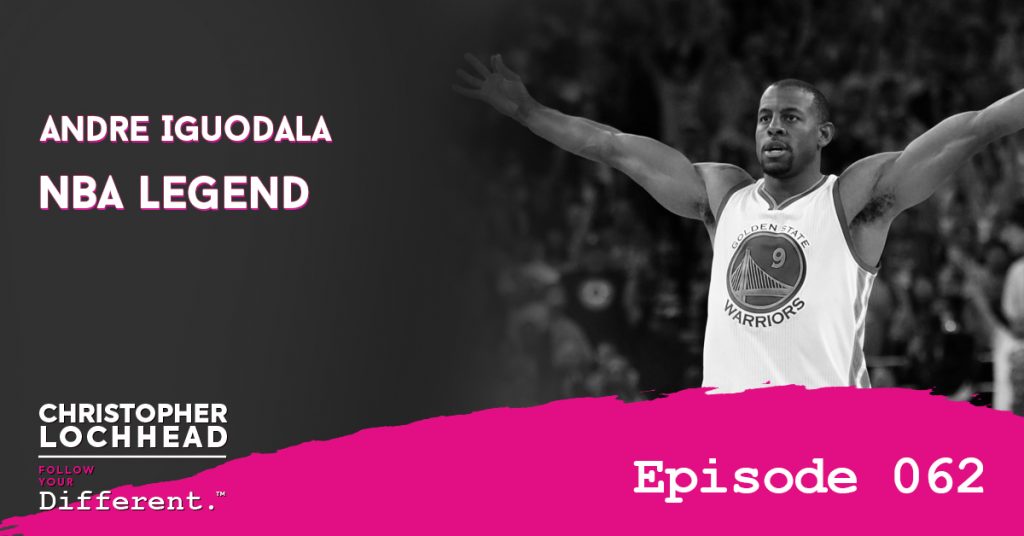
Podcast: Play in new window | Download (Duration: 1:16:46 — 70.6MB) | Embed
Subscribe: Apple Podcasts | Spotify | Pandora | RSS | More
We revisit Lochhead’s conversation with Andre Iguodala to celebrate the basketball legend’s new book, The Sixth Man. What does it take to become an NBA World Champion with a thoughtful life design? The finals MVP of the Golden State Warriors joins us today to give an insider’s view.
“How can this one thing turn into everything? How can you build something that hasn’t been built?” – Andre Iguodala
Finding His Way to the Bay
Before he joined the Warriors, Andre had seen his fair share of rainy and muggy days. It was during that time that he chose to sit back and watch basketball a lot. Seeing his opponents and the certain kind of joy they had, he soon realized that he wanted to be in a place where he could enjoy basketball.
“I just paid attention and it’s kind of being aware of your surroundings. That’s what kind of brought me here.” – Andre Iguodala
Strengthening the Team’s Core
Warriors’ head coach, Steve Kerr understood the ups and downs of playing in the NBA. The environment and mood of the team ultimately affect performance on the court. As coach, he gave the players the freedom to enjoy what they do.
Everyone appreciates this mentality that the coach has. He’s all about supporting everyone and wanting them to succeed. This strong core enables them to build a culture that is key to their success as a team.
Success from Building Culture
A lot of people would say that in order to have success, you need to have the best talent. This is true. But Andre has seen other teams with strong individual talents that fall apart from the lack of a great match of personalities and well-founded culture.
“You can have all the talent in the world but if you don’t have the right culture, their personalities don’t fit, there’s just gonna be a lot of dysfunction.” – Andre Iguodala
There’s plenty of factors that come into play when aiming for success. And a team should act like a machine, with its members on the same page, on the same path, and moving at the same pace.
“What the team has been able to do here is find the right personalities to fit the culture that we have built here.” – Andre Iguodala on the Warriors
To hear more about the Warriors, Andre’s business sense, and his investment in Silicon Valley, download and listen to the episode.
Bio:
Andre Iguodala is a professional basketball player for the Golden State Warriors of the National Basketball Association (NBA). He was an NBA All-Star in 2012 and named to the NBA All-Defensive Team twice.
He won a championship with the Warriors in 2015. Andre was also named the NBA Finals Most Valuable Player that year. He was also a member of the gold-winning national team at the 2010 FIBA World Championship and 2012 Summer Olympics. (Source: Andre Iguodala- Wikipedia)
Links:
Blog on NBC Sports’ “Andre Iguodala Doesn’t Always Do Podcasts”
We hope you enjoyed Andre Iguodala on this episode of Follow Your Different™! Christopher loves hearing from his listeners. Feel free to email him, connect on Facebook, Twitter, Instagram and subscribe on iTunes!
056 It’s The Manager w/ Jim Harter
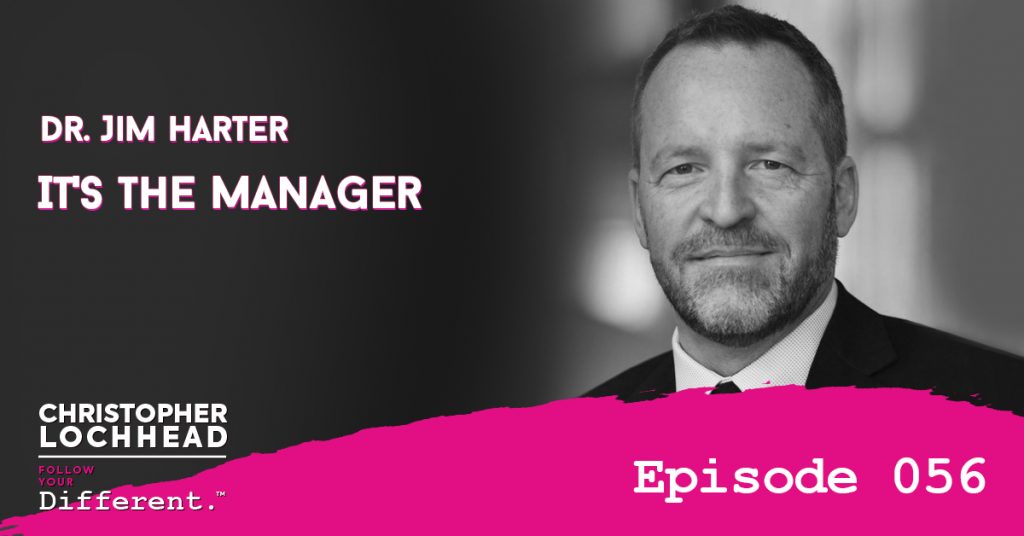
Podcast: Play in new window | Download (Duration: 1:20:33 — 74.0MB) | Embed
Subscribe: Apple Podcasts | Spotify | Pandora | RSS | More
According to Gallup’s management practice Chief Scientist Jim Harter, the productivity of people at work has been increasing… but at a declining rate. More concerning is how only 34% of American workers and two-thirds of managers are engaged at work.
On this episode, he touches on the topic of bosses versus coaches, workplace engagement, people efficiency, and a lot more.
“I want my job to kind of reflect who I am, match my identity… I don’t want my manager to just be an expert on my weakness, I want them to be an expert on my strengths.” – Jim Harter
Changes in Workplace Productivity
The numbers Jim and his teammates have tracked for a while hint on how workplace productivity trends upward, albeit slowly. The figures clearly tell of a room for growth for most organizations.
Workplaces are changing tremendously, and this creates an even bigger burden on leaders. These changes include the massive increases in diversity, technology, remote work, among other things. Needless to say, all these factors affect productivity.
Theory and Practice of Management
There is also the dissonance between the science and practice of management. Leveraging the science is one area for improvement of working environments, and more so its application in practice.
“We’ve seen that the practice of management hasn’t kept up with the science of management. The science of management has advanced significantly in recent decades but the practice of management hasn’t.” – Jim Harter
One such example is how the new workforce has evolved and now ask for a coach, not a boss. Therefore, one of the more critical things organizations need to be thinking about is moving from a culture of boss to coach. This ultimately relates to leaders asking for a change of culture to match the changing workforce.
People Efficiency is the Future
Jim says leaders need to keep up with the changes to both the workforce and the science of management. That is, they need to shift the focus from process efficiency to people efficiency.
“People efficiency is getting people into roles where they know what’s expected of them, where they have clear expectations, where they’re coached on an ongoing basis to do what they do best, to use their strengths.” – Jim Harter
In flexible and remote working environments that are more common nowadays, it becomes even more important to be purposeful about three things. First, there is setting expectations, and then continually touching base with people. Lastly, a workplace needs to be of high trust and accountability.
To hear more about strength-based environments, extrinsic versus intrinsic motivations and more from Jim, download and listen to the episode.
Bio:
Jim Harter, Ph.D., is Chief Scientist for Gallup’s workplace management practice.
He is the coauthor of the New York Times bestseller 12: The Elements of Great Managing, an exploration of the 12 crucial elements for creating and harnessing employee engagement.
Dr. Harter’s book, the New York Times and Wall Street Journal bestseller, Wellbeing: The Five Essential Elements, is based on a global study of what differentiates people who are thriving from those who are not.
His research is featured in First, Break All the Rules, and he contributed the foreword to Gallup’s new edition of this groundbreaking bestseller.
Dr. Harter is the primary researcher and author of the first large-scale, multi-organization study to investigate the relationships between work-unit employee engagement and business results.
Updated periodically, this study currently covers 82,000 business units and includes 1.8 million employees in 230 organizations, across 49 industries and in 73 countries.
His work has appeared in many publications, including Harvard Business Review, The New York Times, The Wall Street Journal, Fast Company and TIME Magazine, and in academic articles and book chapters.
Dr. Harter received his doctorate in psychological and cultural studies in quantitative and qualitative methods from the University of Nebraska-Lincoln (UNL).
Book Overview:
Today’s decline in global productivity has every business leader scrambling to break through with one failed strategy after another.
But the real strategy is already right in front of them. It’s the manager.
In fact, there is no better investment a company can make in its future growth than updating their management playbook to align with today’s very different values and realities.
Based on the largest study of its kind (37.2 million people surveyed) as well as Gallup data from more than 30 years of U.S. and global workplace tracking, including interviews of employees and managers across 160 countries, IT’S THE MANAGER (Gallup Press; May 7, 2019; ISBN: 9781595622242; $34.00) by Chief Scientist for Gallup’s workplace management practice, Jim Harter, Ph.D. with Chairman and CEO of Gallup, Jim Clifton, and is the definitive up-to-date guide to what really works in management today.
IT’S THE MANAGER explores 52 game-changing insights including how to:
- Adapt organizations and cultures to rapid change and new workplace demands
- Meet the challenges of managing remote employees, a diverse workforce, gig workers and the rise of artificial intelligence
- Attract, hire, onboard and retain the best employees to make your organization one of the most desired places to work for current and future stars.
- Transform your managers into coaches who inspire, communicate frequently and develop employee strengths.
The manager has been brushed aside as a middleman that is no longer needed in business today, but Gallup’s data supports a radical claim: that managers should be the cornerstone of every company strategy.
When you build great managers you will experience organic revenue and profit growth, and you will give every employee what they most want today: a great job and a great life.
Links:
We hope you enjoyed Jim Harter on this episode of Follow Your Different™! Christopher loves hearing from his listeners. Feel free to email him, connect on Facebook, Twitter, Instagram and subscribe on iTunes!
044 Legendary Sales Culture with Dan Casetta
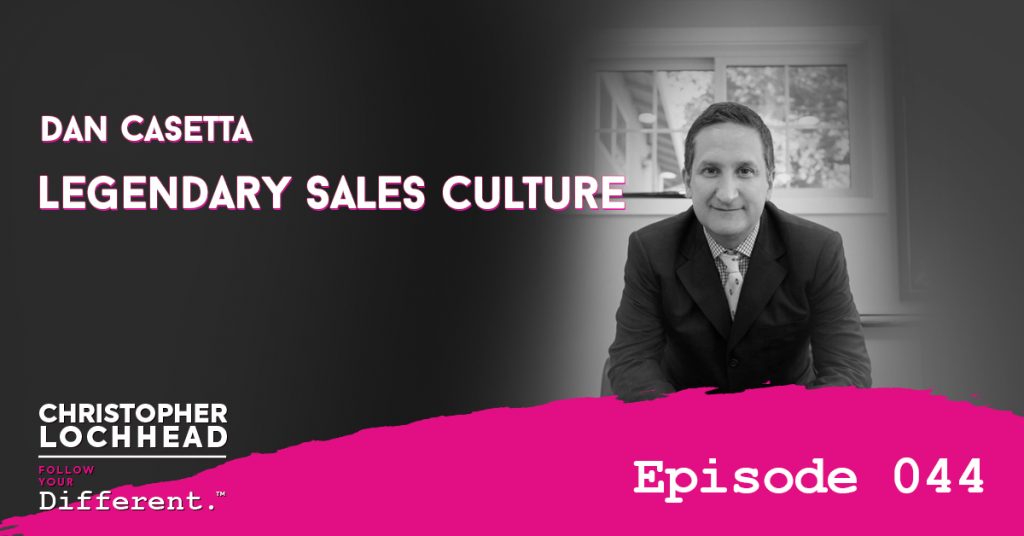
On this episode, we get to hang out with the incredible Dan Casetta. Christopher had a fascinating conversation with Dan about how to build a legendary culture, powerful ideas in recruiting and training, how to lead a young sales teen, how to change limes while saving dimes and a ton more!
Sales Organization
Dan ran the Western part of the Cutco’s sphere that touches the Pacific Ocean with 5,000 salespeople in it. What he loves about this is they get to impact a lot of young people at the time that are critical in their lives.
They get to learn a whole lot of
life skills, knowledge, habits and ways of thinking that make a difference for
them.
“Once you invest time and energy, help them develop and do well, help shape their attitude about the experiences that they have, so that they end up succeeding.” Dan Casetta
Recruitment and
Training
They usually start with the people they know, as in, referrals. It is easier for them to train and develop those people that have been personally recommended. The training is critical and the method of recruiting precedes the training as well.
According to Dan, once the summer is over and school starts, they continue to work with these young people to support their needs. They also have what they call Leadership Academy, where the trainees continue to gain more skills and knowledge that will help them to lead the team.
“We judge people based on attitude, not necessarily based on what part of the town they live in or their background.” – Dan Casetta
Changing Lives
At a very young age, Dan was exposed to the concept of personal development. As he grew up in the business, a large part of the training and development that he did is to help people with their lives.
They teach topics and ideas that are just not related to selling Cutco, but also develop each person in his organization as humans, as people. He created this environment of personal growth in his organization and became successful in this kind of field.
“Help people with their lives, not just their jobs.” – Dan Casetta
To hear more about Dan, a sales leader and business and life coach, download and listen to this episode.
Bio:
Dan Casetta is a record-setting sales manager, business & life coach, national speaker, culture shaping executive and a longtime member of the Cutco. He is also one of the best-selling authors of the book, Success Starts Today with the famous Jack Canfield, author of the “Chicken Soup for the Soul” series.
Some of his blogs are:
• Your Words Matter
• The Magic Secret (Part 1 and 2)
• Decision-Making: Insights to Help You Make Better Choices
• How Much Does It Cost?
• Why Me?
Links:
We hope you enjoyed Dan Casetta on this episode
of Follow Your Different™! Christopher loves hearing from his listeners. Feel
free to email him, connect on Facebook, Twitter, Instagram and
subscribe on iTunes!
042 The Future with Mark Pesce
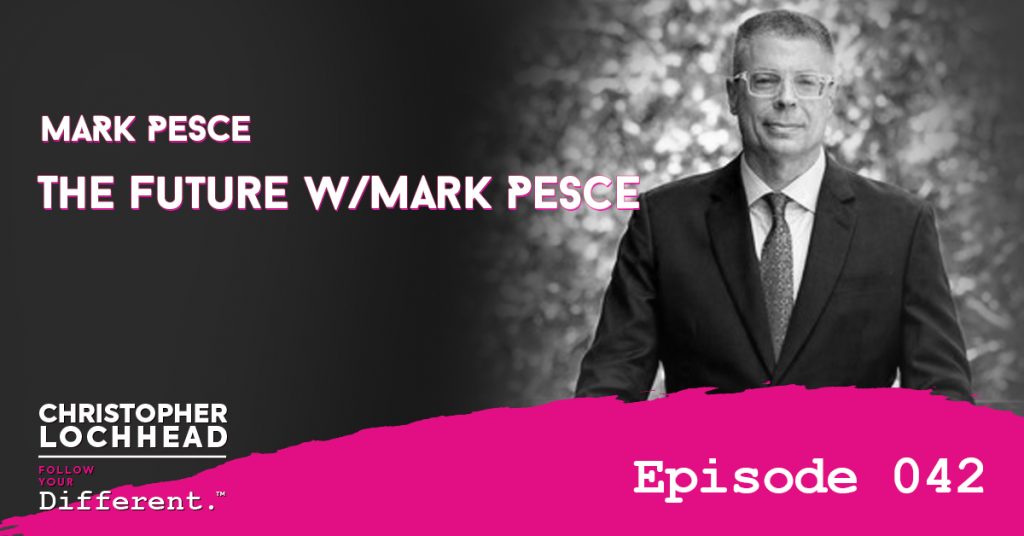
Podcast: Play in new window | Download (Duration: 58:29 — 53.8MB) | Embed
Subscribe: Apple Podcasts | Spotify | Pandora | RSS | More
In today’s episode, we hang out with a leading futurist Mark Pesce. He and Christopher discuss how smart the world is, why we should not be afraid of the future, how the next ten years will play out and how technology will transform our health and well-being.
Path to the Future
People get blindsided, uncontrollable and scared of what the future holds. We tend to give up when we feel that everything is not falling into place. Mark wants to show us that there is always a path through.
We have always had this path. All it takes is looking at our past and the clues to help us understand how we are going to find our .
“People come out of that with the sense of urgency that there is something that they can do, something that they can be that allows them to have not just a stake in the future, but a capacity to keep up with that future.” – Mark Pesce
Fear Because of Change
According to Mark, kids these days are so different because of their experiences.
We ask ourselves why the world is changing and why we can’t keep up. The idea of fear in us is because of change. And it is something that can be tolerated as we have the capacity to learn from one another.
“We like to master things and we don’t like it when those things change from underneath us because it makes us feel like we’re losing on mastery.” – Mark Pesce
A Smarter World
The world is getting smart. There are apps, computers, electronics, high speed mobile Internet and sensors everywhere. Mark said that over the span of 40 years, all we have done is to learn how to take all the principles that are embodied with all of these.
We have such connections, wiring and intelligence of the world that when we look at it one way, it seems very threatening. It can seem that the world is going to be so smart and would not need us anymore. But we should always remember that a machine can be dumped a million times faster than a human can.
“The challenge and pressure for us is can we get smart at the same pace the world is getting smart?” – Mark Pesce
To hear more about Mark, the leading futurist, download and listen to this episode.
Bio:
Mark Pesce is a leading futurist, author, entrepreneur and innovator.
He is an award-winning columnist for The Register and producer and host of This Week in Startups Australia. Mark invented VRML, the standard for 3D on the Web and a core component of MPEG-4. He also authored 6 books including:
• VRML: Browsing and Building Cyberspace
• The Playful World
• The Last Days of Reality
Links:
We hope you enjoyed Mark Pesce on this episode of Follow Your Different™! Christopher loves hearing from his listeners. Feel free to email him, connect on Facebook, Twitter, Instagram and subscribe on iTunes!
025 Courage to be Different w/ Vineet Jain, Founder/CEO Egnyte
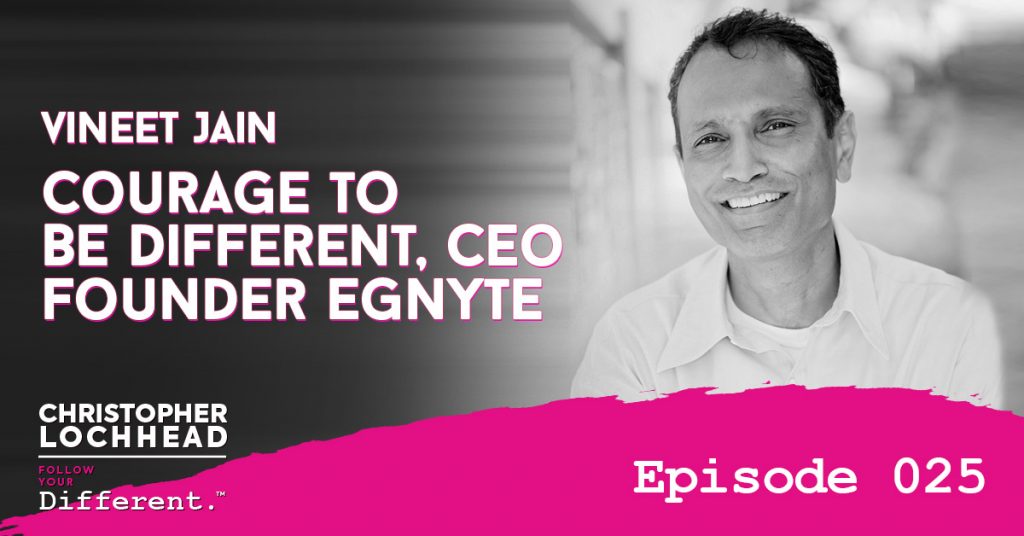
How do you carve out a counter-intuitive niche and be successful at it? On today’s episode, Vineet Jain joins us for a discussion about how he charted a path different from every other tech person’s. He also shares how it all paid off, ten years later.
Swimming Upstream to Grow
Vineet has built a business that has seen nine consecutive quarters of records. They did this against a landscape of massive competitors who at one time looked like they might really threaten Egnyte. And to achieve this, they had to niche down.
“Indeed, this company of ours has grown in the big shadow being cast by some of the players who had a lot more funding.” – Vineet Jain
Financing Against the Trend
Year over year, Egnyte had a compounded growth rate of 30-35% and wasn’t raising much money. It wasn’t until the fourth quarter of 2016 that their cash flow turned positive. But Vineet knew that this wasn’t enough to keep the company afloat.
In August of 2018, he pitched that they raised financing. This was despite the general trend that tech companies observed. Sure enough, Vineet’s confident promise was met, and Goldman Sacks came into the picture.
Divine Luck and Difference
Egnyte had a size disadvantage against other companies in their category. They had a little over 600 employees, so they had to figure out how to play to this asymmetry. Ultimately, they decided to focus on their product and the economics of customer acquisition.
“You cannot pick a fight with an enemy who has picked your weapon of choice.” – Vineet Jain
Even with how they tried to show how they were different, they didn’t escape being lumped with 100 other vendors. But the confluence of two factors helped them rise: the expansion of the category they belonged to and the adoption curve becoming mainstream. With a product that fit the market at an interesting period, they got higher demand.
To hear more about how Vineet worked to build Egnyte to reach its pre-eminence and raised a $75M-funding round, download and listen to the episode.
Bio:
Vineet Jain is the CEO and co-founder of Egnyte.
Prior to Egnyte, Vineet founded and successfully built Valdero, a supply chain software solution provider, funded by KPCB, MDV and Trinity Ventures.
He has held a rich variety of senior operational positions at KPMG and Bechtel. He has 20 years of experience in building capital-efficient and nimble organizations. Vineet earned a BS in Engineering from Delhi College of Engineering and received an MBA from Santa Clara University.
Links:
We hope you enjoyed Vineet Jain on this episode of Follow Your Different™! Christopher loves hearing from his listeners. Feel free to email him, connect on Facebook, Twitter, Instagram and subscribe on iTunes!
024 Brand Activism: Christian Sarkar
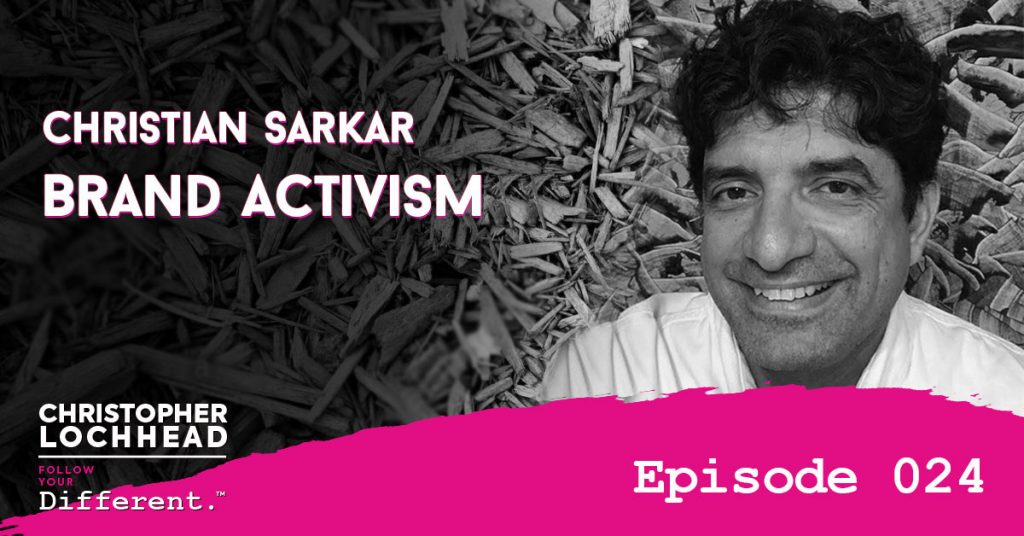
Why is it so hard for these companies to do what is right and fair? On today’s episode, activist Christian Sarkar joins us. He talks about brand activism and why business leaders need to embrace social causes beyond making money.
Uncontrollable Capitalism
Christian says that we have reached a point where the government can no longer control capitalism. There simply isn’t a set of rules to regulate it. This is peak irony, given how guard rails were put up to prevent a repeat of the Roaring Twenties and the Great Depression.
“We have created a culture of governance that is very weak and, by design, has no teeth.” – Christian Sarkar
We have the free market and companies have to play by set, agreed-upon norms. The problem, however, persists. Nobody is addressing the things that endanger not only the economy but the society at large.
Paying Attention to Society
Christian co-authored Brand Activism: From Purpose to Action with Philip Kotler. The book espouses brand activism, something that most companies forget about in their pursuit of capital gains. Capitalism doesn’t pay attention to society enough.
Everyone is so concerned about getting the stocks up, but nobody knows about the three major problems that even the government can’t solve. These include the environment, income inequality, and population control. Neglect these three altogether, and you spell the end of not just your business, but also of the world.
Adopting Brand Activism
It is certainly difficult to create a brand that can lobby for causes that could save the world one person at a time. They don’t teach you charity and social responsibility in a business school. Every time, it is all about maximizing shareholder value.
There are companies who appeal for government funds to protect themselves from the backlash of climate change. The catch is that they have highly contributed to it. It’s time that business leaders choose between stepping up or sitting by the window of this freight train in a collision course.
“This is the problem with market-driven capitalism—that’s just blindly following the pursuit of value extraction.” – Christian Sarkar
To hear more about progressive brand activism and its importance, download and listen to the episode.
Bio:
Christian Sarkar is a Consultant, Author, Entrepreneur, Publisher, Artist, and Activist. With Philip Kotler, he co-authored (“The Father of Modern Marketing) of the bestseller “Brand Activism: From Purpose to Action”. He is also the editor of The Marketing Journal.
Links:
Amazon – Brand Activism: From Purpose to Action
We hope you enjoyed Christian Sarkar on this episode of Follow Your Different™! Christopher loves hearing from his listeners. Feel free to email him, connect on Facebook, Twitter, Instagram and subscribe on iTunes!
012: Negotiation, Teams & Diversity w/ Stanford Prof. Margaret Neale
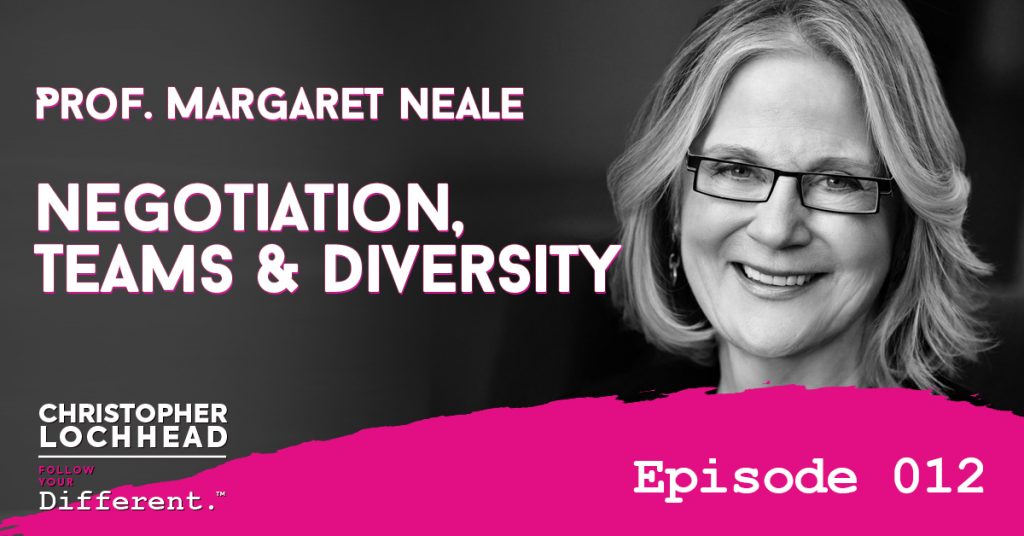
Podcast: Play in new window | Download (Duration: 1:23:55 — 76.9MB) | Embed
Subscribe: Apple Podcasts | Spotify | Pandora | RSS | More
Today, Prof. Margaret Neale joins us for a riveting conversation about research-based negotiation, teams, and diversity. She shares insights that haven’t been heard before, like why engaging in a negotiation as though going into battle is a bad idea.
“When I have this view of negotiation as a battle, then that mindset becomes the filter through which I evaluate all your behaviors.” – Prof. Margaret Neale
On Research-Based Negotiations
Too often, people have a lot of negotiation beliefs and insights that are not supported by empirical evidence. And often, these beliefs are repeated. This is the reason why Prof. Neale tries to help people think about negotiation in a broader sense.
Through her work and teaching, she also shares strategies and tactics that are research-focused and probably not mainstream.
Value Creation and Claiming
Take for example the infamous strategy of most people who engage in negotiation and talking about the price. In order to get what they want, they’re most likely not being truthful. They start way above their ideal price so they can argue their way down the middle, while the other party does the same thing from below.
“The challenge in negotiation is that you are trying in most situations to trade off value creation and value claiming.” – Prof. Margaret Neale
But value creation is a process that’s independent of value claiming. When we think of them simultaneously during a negotiation, we cause the other party to come up with more extreme counteroffers. We are then less likely to find an outcome to the negotiation.
Collateral Damage of Negotiation Battles
The concept of negotiation as a battle creates all sorts of collateral damage. And this is why Prof. Neale wants to move people away from it.
“I make my most malevolent interpretation of those behaviors because you’re the other, you’re the enemy.” – Prof. Margaret Neale
Not to mention that this mindset, when reciprocated, ultimately causes laser-focus on winning the fight. It then becomes a matter of who gets to beat whom, which is far from the true goal of the interaction.
To hear more do’s and don’ts of negotiation and insights on teams and diversity from Prof. Margaret Neale, download and listen to the episode.
Bio:
Dr. Margaret Neale is the Adams Distinguished Professor of Management, Graduate School of Business Stanford and Co-director of Executive Program for Women Leaders.
Margaret Neale’s research focuses primarily on negotiation and team performance. Her work has extended judgment and decision-making research from cognitive psychology to the field of negotiation.
Dr. Neale was the Graduate School of Business John G. McCoy-Banc One Corporation Professor of Organizations and Dispute Resolution from 2000-2012.
Trust Faculty Fellow in 2011-2012 and in 2000-2001. Dr. Neale received her BS in Pharmacy from Northeast Louisiana University, her MS from the Medical College of Virginia and Virginia Commonwealth University, and then her Ph.D. in Business Administration from the University of Texas.
Links:
Graduate School of Business Stanford
Women’s Leadership Innovation Lab
Articles:
- Professor Margaret Neale Named 2011 Davis Award Recipient
- Why Women Must Ask (The Right Way): Negotiation Advice From Stanford’s Margaret A. Neale
We hope you enjoyed Prof. Margaret Neale on this episode of Follow Your Different™! Christopher loves hearing from his listeners. Feel free to email him, connect on Facebook, Twitter, Instagram and subscribe on iTunes!
008 Will Little – Take a Life, Make a Difference
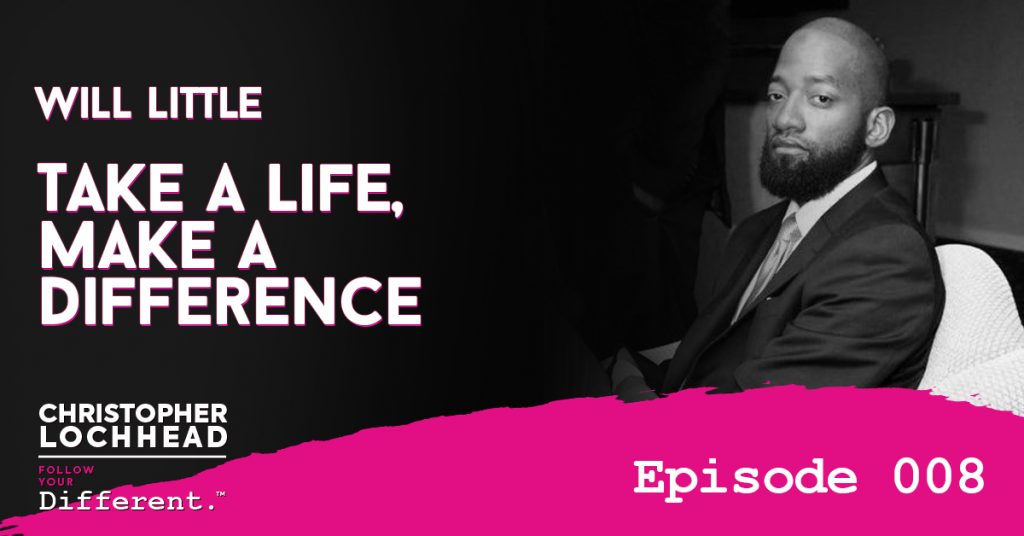
Podcast: Play in new window | Download (Duration: 48:48 — 44.7MB) | Embed
Subscribe: Apple Podcasts | Spotify | Pandora | RSS | More
Today, legendary keynote speaker, barber, and poet Will Little once again joins his friend Christopher. They share an insightful conversation on redemption, forgiveness, and personal transformation.
“We are not having the conversation they need to hear.” – Will Little on young men who feel angered or disconnected
An Eye for an Eye for Most
How would you feel if someone killed your brother, Will would ask people. For most, the first response is to kill. It’s what they feel is right, that there’s no other recourse for them.
This kind of thinking presents a myriad of challenges for young people.
“They’ll have no other authority but to hear the voice of the streets, even if they’re not built by that, even if they’re not in the streets like that.” – Will Little
Voice of the Streets
Sometimes, even the unwilling are forced to take up the gun. After all, it’s what the streets say they must do. But Will has made it his life mission to make people realize that it’s not a path they need to take.
Along with others with the same mindset, Will has been sharing his story to let people know that they can be who they are. While they grew up thinking certain things were real, they can shape their own reality. Understanding all of these brings hopes of growth and learning.
Presenting Possibilities
Ever since he started speaking with groups of young guys, Will quickly learned the most pressing challenge in transforming the lives of others.
“A lot of them see possibility in their life. They just think they’re secluded to this four-block radius where they live at and where they’re from.” – Will Little
To hear more about how Will Little shows young people who he is so they can all make a difference, download and listen to the episode.
Bio:
Growing up in a fraught environment, Will dropped out of school early. He got involved with gangs shortly afterwards, which led to a gunfight that resulted in taking another man’s life. He has since served his sentence in jail for the murder, and now Will goes around having conversations with people.
Will shares his story with youngsters going through same challenges he was in back in the day. Now a keynote speaker, he shows people the possibilities in their lives and how they can transform themselves for the better.
Links:
South Philly Man Turns His Life Around, Now Promoting Peace One T-Shirt at a Time
Anti-Gun Violence Champion Will Little
We hope you enjoyed Will Little on this episode of Follow Your Different™! Christopher loves hearing from his listeners. Feel free to email him, connect on Facebook, Twitter, Instagram and subscribe on iTunes!
218: Jeff Denholm Entrepreneur Fights Wild Fires
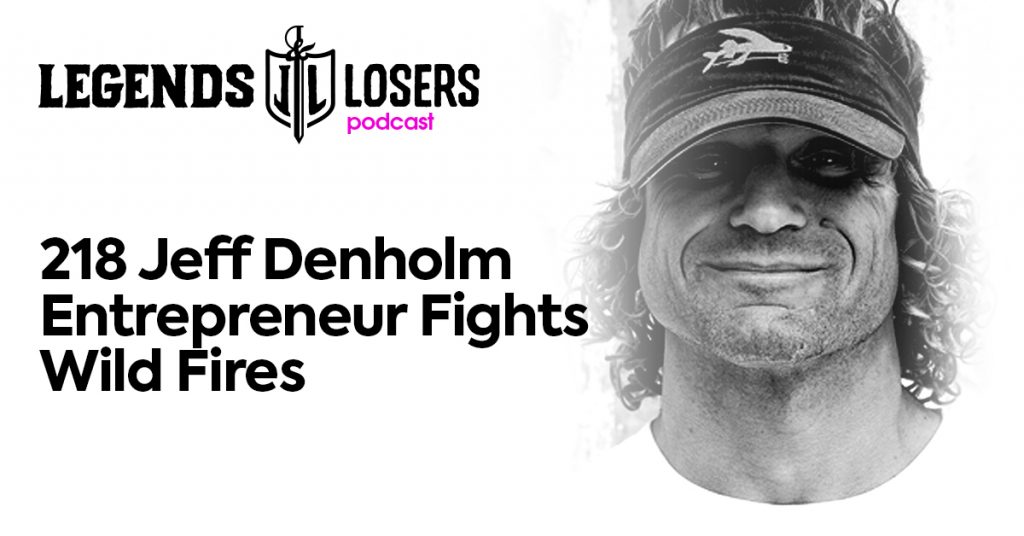
Podcast: Play in new window | Download (Duration: 56:20 — 64.5MB) | Embed
Subscribe: Apple Podcasts | Spotify | Pandora | RSS | More
On episode 66 and 67, Jeff Denholm sat with Christopher Lochhead for the very first time. They previously talked about his incredible athletic achievements as the one-armed surfer and all-around athlete. Today, he shares his entrepreneurial endeavors and how he and his partners are building a company to save the planet, save firefighters, and stop the wildfires.
“Three to four percent of the fire resources these days are private.” – Jeff Denholm on the involvement of the private sector in mitigating wildfire
Three Things We Learned
Glorification of mediocrity
For Jeff, 99% of social media is glorification of mediocrity. These platforms managed to condition people to want to see things deemed to be aesthetically pleasing or those that induce the classic rush of adrenaline. For this very reason, the things that truly matter, like environmental causes, don’t get the attention they deserve.
Fire season of the past
This fifth season that normally throws off anyone accustomed to the four-season scheme used to be three to four months of dry, mid-late summer through early fall, specifically for California. All the plants, or the fuel loads that catch fire, have enough time to dry out. The Sta. Ana breeze then carries whatever object that is lit, and this eventually causes the fires.
Present-day wildfires
Areas where large population centers interface with the dried trees, bushes, and grass often record the biggest wildfires. In California last year, wildfires started as late as December or as early as July. With the current trend of development and global warming, fires have become frequent.
Whether we believe these fires are caused by humans or not, they are happening. And they are not about to go away. This very knowledge has spurred on Jeff and his partners, among other private sector groups, in their pursuit of combating these drastic fires.
Bio:
Jeff wears many hats in life, including entrepreneur, professional athlete, inspirational speaker and environmental steward. ATIRA Systems® is the professional nexus of Jeff’s entrepreneurial spirit and passion for the environment.
While seeking a fire retardant for his Wildfire Equipment Company, Jeff got struck by disturbing statistics about the toxicity of current offerings. He asked himself a question. “What if we could come up with a non-toxic product that is more effective at fighting fires of all types without doing unnecessary harm?”
Jeff discovered that annually, people dump millions of gallons of flame retardant into natural resources. These further destroy precious wetlands and large population centers throughout the world. So began Jeff’s drive to create a business that not only saves lives and structures, but does no harm to the earth.
Links:
We hope you enjoyed Jeff Denholm on this episode of Legends and Losers! Christopher loves hearing from his listeners. Feel free to email him, connect on Facebook, Twitter, Instagram and subscribe on iTunes!

